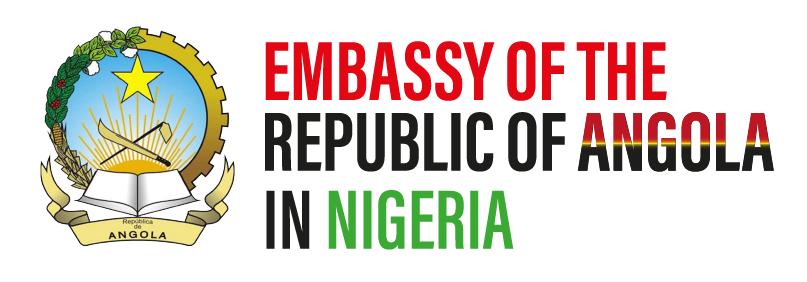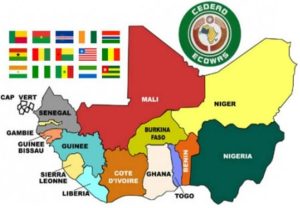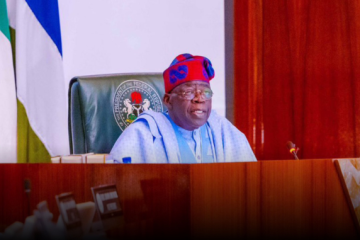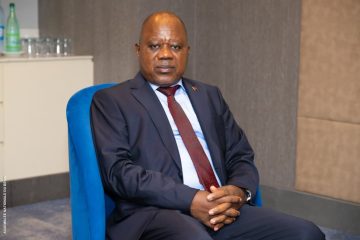President Bola Tinubu was, on Sunday, re-elected for another one-year term as Chairman of the ECOWAS Authority of Heads of States and Government.
Tinubu immediately appointed the President of Senegal, Bassirou Faye and the President of Togo, Faure Gnassingbé, to woo Mali, Burkina Faso and Niger Republic to return to the regional bloc.
Tinubu, whose first tenure is to elapse on July 9, 2024, was elected by a unanimous decision of fellow Heads of Government at the 65th Ordinary Session of the Authority held at the State House, Abuja, on Sunday.
In his acceptance speech, the President said, “I have accepted to continue the service to the great members and the great minds that are committed to democratic values and our journey in the region. I will continue to serve our interests and build on democratic values and the structure that we inherited. Thank you very much.”
Presidency sources had told our correspondent on Saturday night that Tinubu miht be elected for another tenure.
“Some people say he should hand over, and others say he should continue. But they will decide tomorrow,” said the source, who preferred to remain anonymous as he was not authorised to speak on the issue.
Tinubu was elected Chairman of the Authority at the 63rd Ordinary Session of the regional bloc held last July in Bissau, the capital of Guinea-Bissau.
During his first tenure, Tinubu highlighted the alarming levels of insecurity and the increasing pattern of military coups in the region, stressing that these issues demand urgent and concerted efforts from all member states.
He pledged to harmonise existing regional frameworks to tackle unconstitutional regime change and to mobilise resources and political will toward counterterrorism initiatives.
A few weeks after he assumed office, however, Nigeria’s neighbour to the north, Niger Republic, fell to putschists when President Mohamed Bazoum was ousted by members of his guard led by its commander, General Abdourahamane Tchiani.
The civilian governments in Burkina Faso and Mali fell under military control in May 2021 and September 2022, respectively.
Consequently, the ECOWAS announced economic sanctions that isolated the three states alongside Guinea, where the military took over in September 2021.
The bloc suspended all commercial and financial transactions between its current members and the junta-led states, freezing all their assets at the ECOWAS Central Bank—sanctions the affected nations termed “illegitimate, inhumane and irresponsible.”
Although ECOWAS agreed to lift some economic and travel sanctions imposed on Niger, Mali and Burkina Faso in February, the junta-led states maintained their stance to exit the union.
On July 6, leaders of the three countries inched further away from their traditional regional allies when they signed a confederation treaty which, they said, would strengthen a mutual defence pact announced last September, the Alliance of Sahel States.
Niger’s General Abdourahmane Tchiani, Burkina Faso’s Captain Ibrahim Traore, and Mali’s Colonel Assimi Goita were meeting for the first time at the summit in Niamey, the Nigerien capital.
However, the ECOWAS said it was still championing efforts towards reintegrating the sister states into the nearly 50-year-old bloc.
Consequently, Tinubu appointed his Senegalese and Togolese counterparts, Bassirou Faye and Faure Gnassingbé, respectively, to lead ECOWAS’ mediation efforts with Niger, Mali and Burkina Faso.
“I have appointed the President of Senegal, Bassirou Faye, to please become our Special Envoy to Burkina Faso, Mali and Niger Republic, along with the President of Togo, Faure Gnassingbé, to do around-the-clock work with our brothers in Mali, Burkina Faso, and Niger Republic, and to coordinate with me and the ECOWAS Commission, where necessary,” Tinubu announced.
During his official visit to President Tinubu at the State House on May 15, the Faye had vowed to reopen talks with the military juntas following President Tinubu’s appeal for renewed efforts to negotiate their return.
“We can discuss with our brothers and convince them to come back into the fold,” Faye told Tinubu at the time.
While briefing the press after the meeting, the President of the ECOWAS Commission, Dr. Omar Touray, said of Faye’s new assignment, “This is in the spirit of engagement that our leaders believe should continue. Because, we don’t only share borders, we share families, we share communities, and the leaders are determined to do everything possible to keep our community together. ECOWAS is not about heads of state. It’s a community of people that must stay together.”
However, he declined to respond to queries on how long Faye has to deliver on the assignment.
Touray also noted that the contribution of each member state to $2.6bn annual funding for the ECOWAS standby force would be determined by designated experts in the next three months.
On June 28, ECOWAS Defence Chiefs met in Abuja to discuss the proposed $2.6bn budget for activating a 5,000-strong subregional standby force meant to curb terrorism and unconstitutional change of government.
In his opening address on Sunday, Tinubu urged member states to fulfill their financial commitments to tackle insecurity effectively.
“Let me underscore that a peaceful and secure society is essential for achieving our potential, move to operationalise the ECOWAS Standby Force in combating terrorism. I must emphasise that the success of this plan requires not only strong political will but also substantial financial resources.
“We must, therefore, ensure that we meet the expectations and recommendations set forth by our ministers of Defence and Finance in order to counter the insecurity and stabilise our region. Member states must make extra commitment to providing resources for stabilizing the region,” said Tinubu.
Meanwhile, Touray said the experts would determine how much each member state contributes to financing the standby force.
“There is no specific formula yet. Let us wait for the outcome of the expert consultation. We have been given three months to do that. And we will certainly keep you informed.
“The experts from our ministers of finance will convene within the next three months to decide and to assess the various possibilities of raising internal resources to fund the peace and security operations that the commercial community will undertake,” he explained
Touray added that the ECOWAS would continue to engage with Niger, Mali and Burkina Faso on security talks.
“With regard to the participation of the three countries, the instruction we have received from the authorities is to continue to invite them to take part in meetings dealing with security issues as well as sectoral and consultative meetings.
“We will continue to do that. Because we believe we cannot address security alone,” he stated.
The ECOWAS Commission President also provided updates on the single regional currency, the ECO, saying 2027 is still in view for launch.
He announced, “The single currency, as you would note, was one of the items on the agenda of the authority. And the timeframe given for the launch of the single currency is 2027, provided the various convergence criteria are met.
“The challenges meeting those convergence criteria and member states are encouraged to work on those criteria. So the timeframe for now is 2027, and we will go by that until the heads of state change that timeframe.”
He also noted that there will be no visa requirements for nationals of Niger, Mali and Burkina Faso who wish to travel to any ECOWAS member so long as they do not “get out of an arrangement that allows for free movement of people.”
“Let me make it very clear. I am not saying there will be automatic visa requirements. I said there might be a visa requirement if you get out of an arrangement that allows for the free movement of people. So, let that be very clear.
“In a space that has free movement arrangement when you get out of that space, certainly there might be other requirements you may have to put up with,” Touray clarified.
With three years of experience, Stephen, The PUNCH correspondent, has been covering Nigeria’s presidency, politics, security, immigration and trafficking in persons



